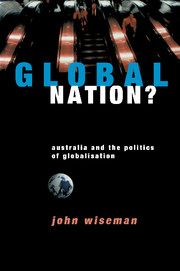Book contents
- Frontmatter
- Contents
- Abbreviations
- Acknowledgments
- 1 Introduction: Australia and the Politics of Globalisation
- 2 Breaking the Spell? Understanding Globalisation
- 3 Transforming the Global Economy? Trade, Capital and Power in the Late Twentieth Century
- 4 Onto the Global Racetrack? Globalising the Australian Economy
- 5 The Price of Competitiveness? The Social Impact of Globalisation on Australia
- 6 Wired to the World? Australia and the Globalisation of Media and Information Technologies
- 7 Nowhere to Hide? Australia in the Global Environment
- 8 Where in the World? Transforming Australian Political Relationships and National Identities
- 9 Alternative Strategies? Thinking and Acting Globally and Regionally
- 10 Alternative Directions? Thinking and Acting Locally and Nationally
- 11 Conclusion
- Notes
- Bibliography
- Index
9 - Alternative Strategies? Thinking and Acting Globally and Regionally
Published online by Cambridge University Press: 20 May 2010
- Frontmatter
- Contents
- Abbreviations
- Acknowledgments
- 1 Introduction: Australia and the Politics of Globalisation
- 2 Breaking the Spell? Understanding Globalisation
- 3 Transforming the Global Economy? Trade, Capital and Power in the Late Twentieth Century
- 4 Onto the Global Racetrack? Globalising the Australian Economy
- 5 The Price of Competitiveness? The Social Impact of Globalisation on Australia
- 6 Wired to the World? Australia and the Globalisation of Media and Information Technologies
- 7 Nowhere to Hide? Australia in the Global Environment
- 8 Where in the World? Transforming Australian Political Relationships and National Identities
- 9 Alternative Strategies? Thinking and Acting Globally and Regionally
- 10 Alternative Directions? Thinking and Acting Locally and Nationally
- 11 Conclusion
- Notes
- Bibliography
- Index
Summary
In the era of globalization it is becoming clearer than ever that the world's problems have the same origins: implementation of a neo-liberal agenda which brings pauperisation and ecological devastation. So the solidarity of the peoples must be built on the following basic principle: ‘In helping yourself, you help me’.
Steve PenicheIt is not enough to teach people how to swim better in a tide, a time comes when people have to do more than swim more effectively. They have to get together and say, ‘This river seems to be going in the wrong direction and somehow has to be stopped, has to be dammed up and has to be redirected.’ That is the role of citizen action.
Stephen GerbnerThis chapter and the next aim to counter the paralysing impact of the belief that there are no longer any political choices in a globalised world by presenting a series of propositions about alternative responses to globalisation. The central argument is that globalisation involves a range of contradictory and contested processes that provide new possibilities, as well as threats, to communities concerned with promoting relationships of diversity, solidarity and sustainability. The central challenge is to recognise the connections between action at different levels of geographical space and political governance and to think and act on a range of levels without losing our grounding in the particularity of our own home place.
- Type
- Chapter
- Information
- Global Nation?Australia and the Politics of Globalisation, pp. 116 - 130Publisher: Cambridge University PressPrint publication year: 1998



